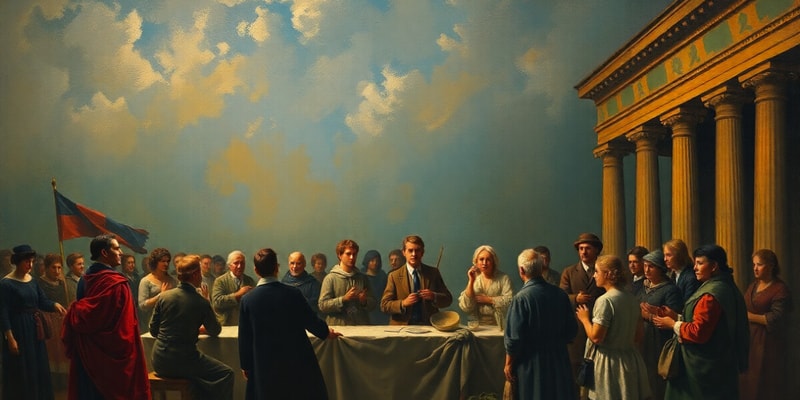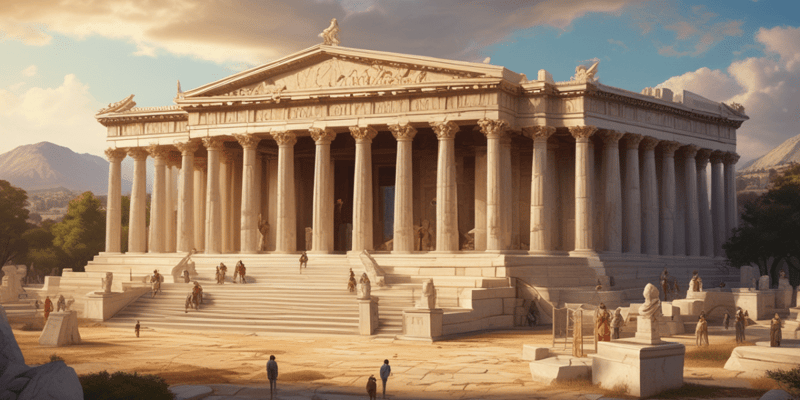Podcast Beta
Questions and Answers
Which characteristic of classical democracy ensures that officials are selected randomly?
What aspect of liberal democracy aids in preventing the domination of a single group?
In classical democracy, which characteristic allows citizens to actively participate in decision-making?
Which feature of liberal democracy ensures that individual rights are protected against majority rule?
Signup and view all the answers
What condition of the state of nature, according to Locke, motivates individuals to establish a government?
Signup and view all the answers
What does the state of nature emphasize regarding individual actions?
Signup and view all the answers
Why do people leave the state of nature according to the content?
Signup and view all the answers
What is a key characteristic of pure democracy as described?
Signup and view all the answers
What is the main reason J.S. Mill advocates for freedom of expression?
Signup and view all the answers
What is one downside of pure democracy mentioned in the content?
Signup and view all the answers
What does Madison's argument for representative democracy include?
Signup and view all the answers
Why is the act of authority suppressing opinion problematic, according to Mill?
Signup and view all the answers
What essential aspect is missed in the state of nature according to the content?
Signup and view all the answers
What characteristic of classical democracy reflects the principle of equal political participation among citizens?
Signup and view all the answers
Which feature differentiates liberal democracy from classical democracy concerning citizen participation?
Signup and view all the answers
Which of the following best describes a limitation found in classical democracy compared to liberal democracy?
Signup and view all the answers
In Locke’s concept, which factor influences individuals to abandon the state of nature?
Signup and view all the answers
Which principle in liberal democracy is aimed at preventing the concentration of power and ensuring government accountability?
Signup and view all the answers
What is the primary motivation for individuals to leave the state of nature?
Signup and view all the answers
According to the content, how does a representative democracy address the issues found in pure democracy?
Signup and view all the answers
What aspect of the state of nature emphasizes the lack of established law?
Signup and view all the answers
Which argument does J.S. Mill make regarding the collision of opinions?
Signup and view all the answers
Why does Madison believe pure democracy is problematic when populations grow?
Signup and view all the answers
What is one consequence of authority suppressing opinions, according to Mill?
Signup and view all the answers
In the context of the content, what role is designated to the government?
Signup and view all the answers
What is a central theme in the law of nature as described in the content?
Signup and view all the answers
Study Notes
Classical Democracy/Athenian Democracy
- Direct democracy: citizens vote directly on laws and policies.
- Equal weight of votes: each citizen's vote had the same value, regardless of class or status.
- Lottery-based selection of officials: political positions were randomly assigned to ensure fairness and prevent corruption.
- Short terms of office: officials served short terms, usually only once or twice.
- Political equality: All free male citizens were equally members of the political community.
- Limited free speech: Although freedom of speech existed, it was limited; those who spoke out too strongly could be exiled.
Liberal Democracy
- Natural law: The idea that there are fundamental rights inherent to all human beings.
- Separation of powers: Power is divided between different branches of government, such as the executive, legislative, and judicial branches, to prevent tyranny.
- Regular elections: Citizens have the right to participate in regular elections to choose their representatives.
John Locke's State of Nature
- The State of Nature represents a condition of freedom and equality.
- Individuals are governed by the Law of Nature, which dictates that everyone has the right to life, liberty, and property.
- Humans leave the state of nature to form governments to protect their rights and better enforce the Law of Nature.
Madison and Representative Government
- Madison believed a representative government in an extended republic could overcome the "excesses" of direct democracy.
- His reasoning was that direct democracy could lead to the tyranny of the majority, but representative democracy, by filtering public opinion, could protect minority rights.
J.S. Mill and Freedom of Expression
- Mill argued for freedom of expression because he believed it was essential to the advancement of knowledge and the discovery of truth.
- He believed suppressing opinions could hinder progress, as even false opinions may hold a partial truth.
- Mill also believed that hearing and debating opposing opinions helps refine our own beliefs.
Classical Democracy/ Athenian Democracy
- Direct democracy: All citizens directly vote on all matters.
- Equal weight of vote: All citizens have an equal say in decisions.
- Lottery based selection of officials: Public officials are chosen randomly, not by election.
- Short terms of office: Leaders serve for brief periods, preventing undue power accumulation.
- Limited free speech: Allowed in the assembly but with restrictions.
Liberal Democracy
- Natural law: Rights are inherent and precede government, derived from a higher authority.
- Limited government: Individual rights and freedoms are valued above state power.
- Separation of Powers: Government authority is divided among branches, creating checks and balances.
The State of Nature (Locke)
- Peaceful Co-existence: Individuals are naturally free and equal, capable of living in harmony.
- Self-preservation and Natural Law: Individuals have a right to defend themselves against harm adhering to God's laws.
- Need for Government: Individuals enter into a social contract to establish a government for protection and enforcement.
Representative Government (Madison)
- Excesses of Pure Democracy: Direct democracy can lead to tyranny of the majority, infringing minority rights.
- Representative Democracy is better suited for large societies.
- Election of Wise Leaders: Representative government aims to select competent individuals who can better represent the citizenry.
Freedom of Expression (Mill)
- Diversity of Opinion: The collision of viewpoints leads to the refinement of ideas.
- Truth Seeking: Even false opinions can contribute to the overall understanding of truth.
- Individual Autonomy: Freedom of expression is essential for individual development and self-fulfillment.
Studying That Suits You
Use AI to generate personalized quizzes and flashcards to suit your learning preferences.
Related Documents
Description
This quiz explores the key features of both Classical Democracy, particularly Athenian Democracy, and Liberal Democracy. You'll learn about direct voting, equal representation, and the separation of powers. Test your understanding of these influential democratic systems.



